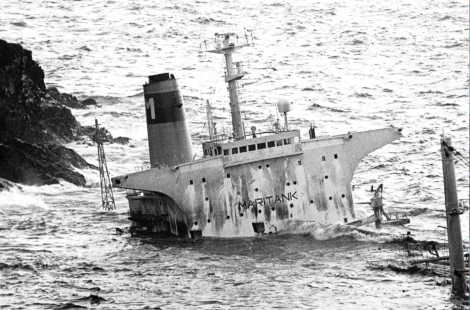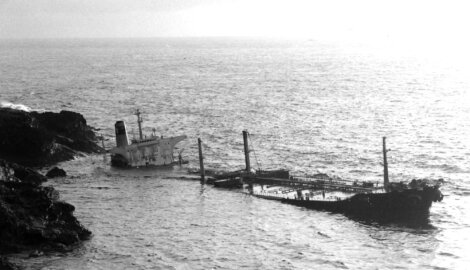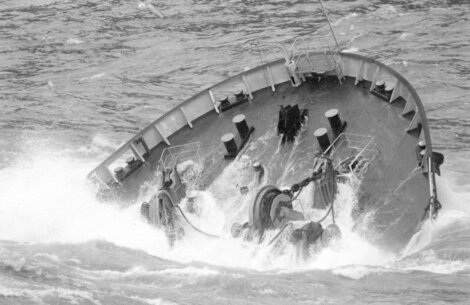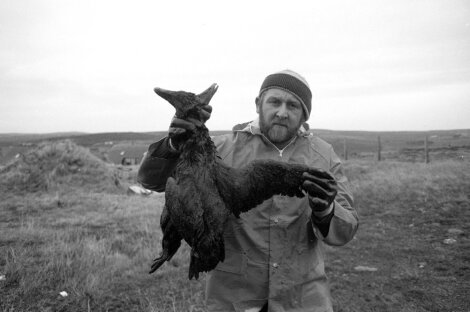Environment / Braer 30 years on – the moment in history Shetland got away with it
Can a tanker accident happen again? And if so, how prepared is Shetland?
THIRTY years after Shetland luckily escaped what could have been a terrible environmental disaster there are warnings that the isles continue to be vulnerable to a Braer-type incident despite modern technology and tighter regulations for passing tankers.
The concerns come from two men, both in the 70s and very different in style and demeanour, who were ‘in the thick of it’ back in January 1993 albeit in different roles.
When now retired journalist Jonathan Wills got a phone call in the early hours of 5 January his unnamed source only said, “this is the big one”.
Captain George Sutherland, director of marine operation at Shetland Islands Council and the local authority’s deputy chief executive at the time, received a similar, slightly more official call, saying more or less the same.
Meanwhile, the tanker Braer, laden with 84,500 tonnes of Norwegian crude and 2,000 tonnes of bunker oil, was drifting helplessly in the Fair Isle channel while a violent force 11 storm was pushing the stricken vessel relentlessly towards the southern tip of Shetland.
The Liberian registered vessel grounded on rocks at Garths Ness later the same morning after coastguard teams managed to winch all 34 crew members to safety and an attempt to attach a tow line by the tug Star Sirius had failed.
Within minutes the vessel started breaking up and the entire cargo spilled into the sea leaving Shetland at the brink of an environmental disaster that could have been a repeat of what the world had witnessed just a few years earlier when the Exxon Valdez ran aground in Prince William Sound in Alaska on 24 March 1989.
Become a supporter of Shetland News
That it did not was pure luck and had little to do with the local response to the unfolding disaster.
Without what seemed to be a never-ending January storm that broke up the light Gullfaks crude and dispersed it widely into the vast open ocean, Shetland could still be suffering from oil pollution as Prince William Sound does to this day.
Because this happened in the middle of winter the number of wildlife casualties was significantly lower than they would have been at a different time of year. A fishing exclusion zone was established and thousands of tonnes of farmed salmon in the waters around Burra were culled with fishermen and salmon farmers having to wait for years for compensation payments to be made by the International Oil Pollution Compensation funds (IOPC)
Capt Sutherland who led the council’s response at the time is convinced that next time Shetland might not be so lucky.
“We were lucky on a variety of grounds,” he said. “There was somebody up there being a very good friend of us and took care of us. Despite all our efforts much of it happened without us.
“The weather created the monster in the first place, but it also cleared up the mess for us.”
Wills agrees, despite changes that have been made in the wake of the grounding to the way coastguards have been empowered to respond to an emergency.
“It could happen again tomorrow,” he said. “If it did happen tomorrow, we would know it is happening much earlier and it would be possible to get assistance to the vessel much earlier, if they declared an emergency.
“The fact that they now have to report in when entering the Fair Isle channel is significant, but there is still a lot of tanker traffic passing here, and a lot of stuff out there is coming from Murmansk in Russia.
“And this is not the best tonnage in the world; the standards of the ships are not as high as the standards of tankers coming out of Sullom Voe for example.”
“I have seen the Exxon Valdez; I have seen the utter catastrophe. Luckily, we didn’t have that catastrophe because the oil was lighter crude, and because the weather was appalling the elements dispersed that oil spill, and within three weeks most of it had gone.
“However, just because we got away with it when the Braer grounded doesn’t mean we will get away with it again. [Next time] it might be a thicker oil, there might not be a hurricane to deal with it.
“So, yes we are still at risk, and it is a worry.”
As the events of January 1993 slip from collective memory, complacency and a lack of urgency is taking over, both men are convinced.
Capt Sutherland said the experience of the Braer had “put a little more steel” in him to continue pursuing what he calls “the preventative route”.
“I am sure that the bulk of the population never think for one minute about the tanker traffic bypassing Shetland on a regular basis,” he said.
“It is not easy to persuade accountants and people who control the purse strings that money should be spent on something that might never happen.
“But, of course, it will happen again. If it can go wrong, it will.”
Wills added: “The danger of not having had an accident like this for a very long time is that you become complacent, and you assume everything we will okay.”
“We saw that a few years ago when they started parking loaded tankers two miles off Bressay because it was convenient for the owners.”
Following on from recommendations made in the Donaldson inquiry into the grounding of the Braer and a long campaign by local people, two emergency towing vessels (ETVs) were eventually stationed in the north and west of Scotland to be of assistance during any maritime emergency.
In summer 2012 the number of ETVs was halved and a decision made for the one remaining ocean-going tug covering the north and west of Scotland to be based in Orkney.
Council convener Andrea Manson said the campaign to get that second ETV back was still ongoing though she was not particularly optimistic if would ever happen.
Recalling “that terrible feeling of impending doom” as the community watched helplessly for the Braer to come ashore, she said that one never wanted to live through those days in January 1993 again.
“We need an ETV for any vessel that is in trouble. Bending government official’s ears about the issue will always be on our agenda,” she said.
“You always ask and at some point you might get a willing ear that is listening to you, and we will get a second one.
“And that also is why we make a fuss about tankers wanting to shelter off our shores, because it is just too near if anything happens, the further away they are the better.”
Exercise Phoenix
Meanwhile, the authority tasked to respond to a pollution incident, the Maritime and Coastguard Agency (MCA), said it was well prepared to deal with “any and every” pollution incident.
Only last summer a large multi-agency exercise simulating a large and complex emergency in the waters off Shetland – Exercise Phoenix – found the national contingency plan (NCP) to be “broadly effective”.
The scenario played out involved a collision of a supply vessel with an oil production platform 80 miles to the west of Shetland resulting in an uncontrolled release of oil as well as requiring the evacuation of crew before the vessel sank.
The 99-page exercise report, published in October 2022, makes a raft a recommendations to improve readiness and co-operation between agencies.
A spokesperson for the MCA in Southampton said: “The UK has in place well-understood and well-practised plans in order to deal with pollution at sea so as to quickly respond, limit and reduce impacts on the environment, marine habitats and local coastal communities; working with local authorities, resilience forums and emergency services to prepare, communicate and co-ordinate a coherent response.
“We hold a national counter pollution exercise on a regular basis around the UK to make sure that everyone involved can test out their own systems in a safe environment and apply any learnings.
“Although we can never say never, we are confident that we have an operational response in readiness to any and every incident which could bring pollution to our shores.”
The exercise report also makes a series of observations (pages 77 and 78) directed at the SIC including that the local draft oil spill contingency plan was unclear on strategic priorities and agendas.
It points out that “resilience at Shetland Islands Council was stretched, as became apparent when individuals not intending to respond to the exercise were required to do so”.
The council’s executive manager for governance and law, Jan Riise, said in response that all points raised had been addressed.
“After any emergency planning exercise, the agencies involved will look at how their responses could be further improved. The minor observations from Exercise Phoenix which were directed at Shetland Islands Council have been addressed,” he said.
Notes:
Jonathan Wills has written extensively about what led the tanker Braer to lose power in a violent storm. An article last updated five years ago on what really happened on the Braer can be found here.
He also published a memoir Reporter on the Rocks on Amazon which contains the most updated version of events that led to the grounding of the tanker.
Become a supporter of Shetland News
Shetland News is asking its many readers to consider start paying for their dose of the latest local news delivered straight to their PC, tablet or mobile phone.
Journalism comes at a price and because that price is not being paid in today’s rapidly changing media world, most publishers - national and local - struggle financially despite very healthy audience figures.
Most online publishers have started charging for access to their websites, others have chosen a different route. Shetland News currently has over 600 supporters who are all making small voluntary financial contributions. All funds go towards covering our cost and improving the service further.
Your contribution will ensure Shetland News can: -
- Bring you the headlines as they happen;
- Stay editorially independent;
- Give a voice to the community;
- Grow site traffic further;
- Research and publish more in-depth news, including more Shetland Lives features.
If you appreciate what we do and feel strongly about impartial local journalism, then please become a supporter of Shetland News by either making a single payment or monthly subscription.
Support us from as little as £3 per month – it only takes a minute to sign up. Thank you.


















